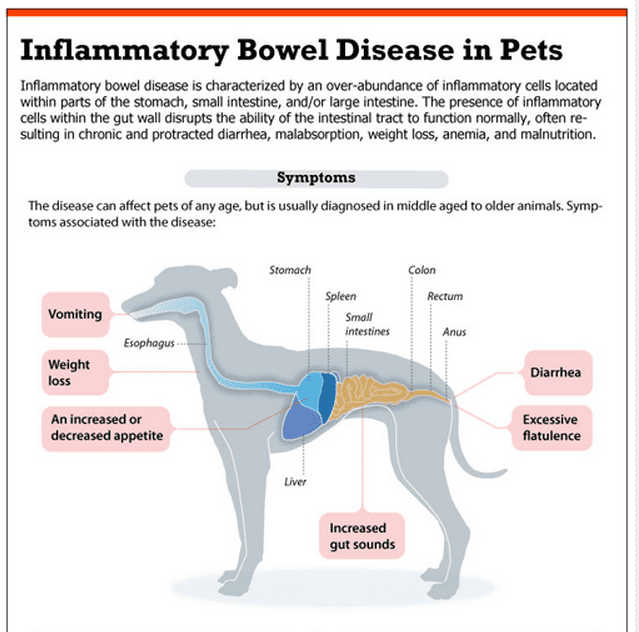
Enflamasyon nan trip yo nan yon chen: kòz ak tretman
There are few things in the world that can make a dog owner jump out of bed faster than the sound that unmistakably foreshadows that his pet is about to vomit his dinner on the carpet.
Dogs, like humans, experience occasional bouts of vomiting and diarrhea. But if your pet’s stomach problems persist after a couple of days, you’ll need to talk to your veterinarian about inflammatory bowel disease (IBD) in dogs and related conditions, including colitis in dogs.
contents
What is Inflammatory Bowel Disease in Dogs?
Inflammation of the intestines in a dog is a condition characterized by the development of inflammation of the walls of the gastrointestinal tract. Signs of the disease include frequent vomiting, decreased appetite, weight loss, loose stools, and frequent bowel movements. If you experience any of the above symptoms, you should contact your veterinarian.
The main part of the immune system of animals is located in the gastrointestinal tract, so its imbalance affects the overall health and well-being of the animal. Over time, IBD in dogs can lead to weight loss, reduced muscle mass, and poor coat condition.
Causes of intestinal inflammation in dogs
Eaten food, passing through the esophagus, enters the stomach. There it lingers and undergoes chemical digestion into a more liquid substance called chyme. The chyme then travels to the small intestine, where bacteria living in the gastrointestinal tract break it down, extracting nutrients that are absorbed by cells in the small intestine.
The last stop in the gastrointestinal tract is the large intestine. Here, water is absorbed and waste products are formed into feces, which are subsequently excreted from the body.
This process can be disrupted – in one or more areas – as a result of inflammation, which interferes with the proper functioning of organs. This condition is called gastritis and is usually manifested by vomiting.
Inflammation of the small intestine is called enteritis, and inflammation of the large intestine is called colitis. Describing a dog’s diarrhea will help the veterinarian determine whether the dog’s gastrointestinal problems are caused by enteritis or colitis and help determine the correct course of treatment.
How is IBD in dogs different from irritable bowel syndrome?
The clinical symptoms of IBD in dogs may be similar to irritable bowel syndrome (IBS) in humans, but the underlying cause is completely different. It is believed that IBS in humans occurs as a result of increased contractile activity of the muscular layer of the intestinal wall.
In IBD, inflammatory cells change the intestinal mucosa. Inflammation is an overreaction of the immune system to food eaten by a dog or a malfunction of the immune system called an autoimmune disease. It leads to discomfort and impairs the ability of the gastrointestinal tract to properly absorb nutrients..
Diagnosis of IBD in Dogs
In order to determine if a dog has IBD, a veterinarian will first take blood and stool samples from the dog for analysis to assess general health and rule out other conditions. Abdominal imaging may also require ultrasound or x-rays. For a definitive diagnosis, a biopsy of the intestinal tissue is necessary.
Treatment of inflammatory bowel disease in dogs
If a dog is diagnosed with IBD, there are several treatment options that will depend on the severity of the disease.
The first line of defense is often a therapeutic nutrition plan, such as a prescription diet dog food. Diet foods include easily digestible formulas, new or hydrolysed protein formulas, and high-fiber formulas. All of these formulas work in different ways to help the gastrointestinal tract function more efficiently.
- The second step is to maintain the health of the dog’s unique microbiome, the environment of billions of bacteria in its gut. The microbiome is controlled by prebiotic fibers or postbiotic end products. There is ongoing research into how diet can influence the microbiome of dogs. Accordingly, formulas are being developed that increase the number of beneficial bacteria and disable the function of harmful bacteria.
- In addition to nutrition, medications may be needed to help reduce inflammation in the intestinal mucosa. In severe cases, a dog with IBD will need to take medication for the rest of its life. In other cases, drugs are taken only until the balance of the intestinal microbiome is normalized.
No one likes their dog having diarrhea or vomiting all the time. However, there are a number of steps you can take to help your pet feel comfortable, save the carpets in your home, and most importantly, improve your pet’s overall health.





